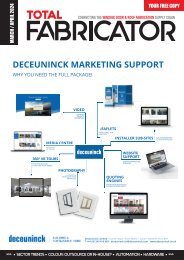August 2020
Create successful ePaper yourself
Turn your PDF publications into a flip-book with our unique Google optimized e-Paper software.
Industry News
HAVE YOU GOT WHAT
IT TAKES FOR LRWA’S
VIRTUAL CHALLENGE?
After taking the difficult decision to cancel
this year’s Dragon Boat Regatta, the
LRWA’s charity boat race which raises
funds for good causes, the LRWA has
announced a new and exciting virtual
challenge for teams of up to eleven
participants.
The LRWA Virtual Dragon Team Challenge
enables participants to test themselves
individually and contribute to a team result
and win medals. The challenge requires each
team to submit the top 11 distances
completed in a 30 minute period by either
running, walking, swimming or cycling, and
the distances must be measured in km.
The LRWA Virtual Dragon Team Challenge is
free to enter and will run between the 10th –
30th August. The registration site is now
open for participants and the LRWA says this
is “a fantastic opportunity to have fun, work
as a team towards a common goal and raise
the profile of our industry.”
The LRWA will add a 10km bonus to the
overall total of the team that raises the most
money for Mates in Mind, the LRWA’s chosen
charity for 2020. Whilst it is not mandatory
to fundraise, the LRWA says all proceeds will
go towards the Mates in Mind Covid-19
Relief Fund.
Find out more and register:
www.lrwa.org.uk
More news, updates and interviews at www.total-contractor.co.uk
“SIGNIFICANT REFORMS” TO PLANNING
“An overhaul of the country’s outdated
planning system that will deliver the highquality,
sustainable homes communities
need” was announced by Housing Secretary
Robert Jenrick on 6th August, as he launched
the Planning for the future consultation, which
has been described as “the most significant
reforms to housing policy in decades.”
A statement from Government explains that the
“landmark changes will transform a system that
has long been criticised for being too sluggish in
providing housing for families, key workers and
young people, and too ineffectual in obligating
developers to properly fund the infrastructure –
such as schools, roads and GP surgeries – to
support them.”
The announcement says the reforms outlined in
Planning for the future will allow for more building
on brownfield land so valued green space and
Green Belt will continue to be protected, and
“local community agreement will be at the centre
of the proposals being put forward.”
The reforms are expected to be a major boost for
SME builders “who will be key players in getting the
country building on the scale needed to drive our
economic recovery”, but at the moment it says
these builders are “currently cut off by the planning
process”, and this is highlighted by the fact that
“the proportion of new homebuilding they (SME
builders) lead on” has “dropped from 40% 30 years
ago to just 12% today.”
Housing Secretary Robert Jenrick explained: “Our
complex planning system has been a barrier to
building the homes people need; it takes 7 years
to agree local housing plans and 5 years just to
get a spade in the ground.
“These once in a generation reforms will lay the
foundations for a brighter future, providing more
homes for young people and creating better
quality neighbourhoods and homes across the
country. We will cut red tape, but not standards,
placing a higher regard on quality, design and the
The reforms will mean:
• Local communities will be consulted from the very
beginning of the planning process. By harnessing the
latest technology through online maps and data, the
whole system will be made more accessible
• Valued green spaces will be protected for future
generations by allowing for more building on
brownfield land and all new streets to be tree lined
• Much-needed homes will be built quicker by
ensuring local housing plans are developed and
agreed in 30 months – down from the current 7
years
• Every area to have a local plan in place – currently
only 50% of local areas has a plan to build more
homes
• The planning process to be overhauled and
replaced with a clearer, rules based system.
Currently around a third of planning cases that go to
appeal are overturned at appeal
• A new simpler national levy to replace the current
system of developer contributions which often
causes delay
• The creation of a fast-track system for beautiful
buildings and establishing local design guidance for
developers to build and preserve beautiful
communities
• All new homes to be ‘zero carbon ready’, with no
new homes delivered under the new system needed
to be retrofitted as we achieve our commitment to
net zero carbon emissions by 2050
environment than ever before. Planning decisions
will be simple and transparent, with local
democracy at the heart of the process.
Whilst welcoming the reforms and “the much
needed opportunity to speed up the planning
process and help diversify the housing market”,
the Federation of Master Builders (FMB)
cautioned that “any shake-up must not
compromise the quality of the homes built.”
Brian Berry, Chief Executive of the FMB, said: “We
need a simpler and more responsive planning
system, but I am clear that this shouldn’t
compromise the quality of the homes that are built.
Master Builders compete on quality, not on price,
and have an important role to play in a more
diverse housing market. We must also ensure local
planning authorities are supported to respond to
these changes, so that any shake-up doesn’t lead
to further short-term delays in applications.”
8 TC AUGUST 2020

















